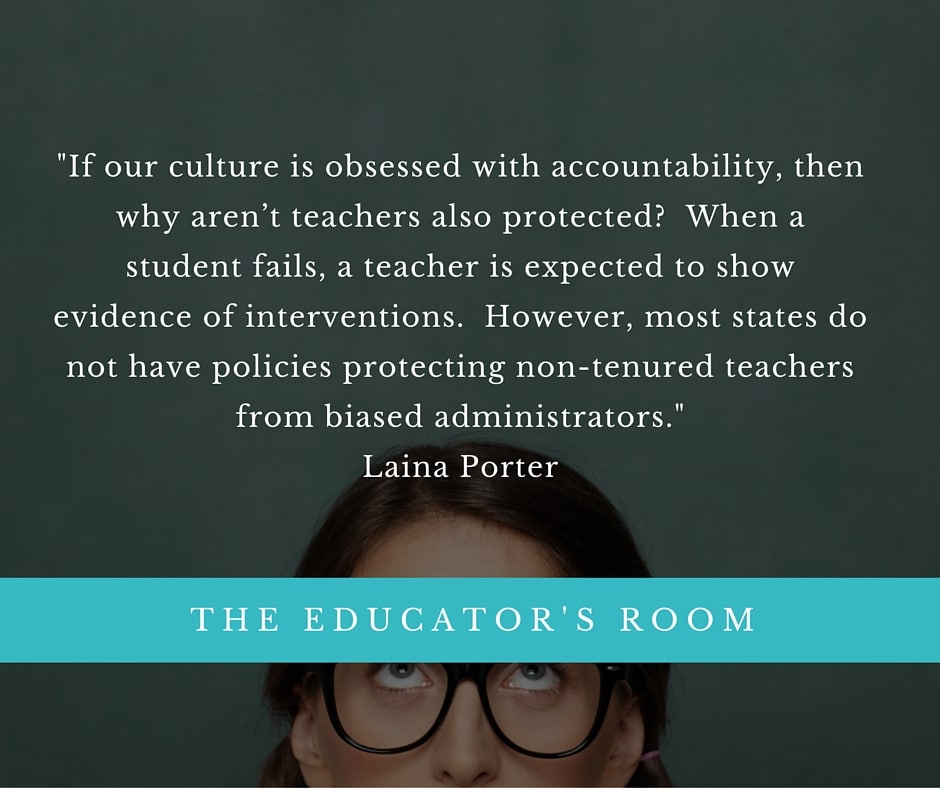“When I first started teaching, I thought that I was doing it for all of the right reasons: shorter hours, summers off, no accountability.”- Bad Teacher
In one of my undergraduate courses, we analyzed the culture’s view of teachers. Although inspirational teachers like Mr. Feeny (Boy Meets World), Mr. Holland (Mr. Holland’s Opus), and Mr. Keating (Dead Poets Society) were the first examples we mentioned, most of America’s entertainment teachers are portrayed as the enemy (Ferris Bueller’s Day Off), a circus show (South Park), or a deadbeat (Half Nelson). And let’s not forget the countless examples of inappropriate teacher-student relationships. Other first world cultures honor educators, but Americans are suspicious of and sometimes hostile towards teachers. With the push for accountability, teachers are under more scrutiny than ever before: Students and parents are suing teachers for “incompetency;” legislators are passing laws to formulaically evaluate teachers; the public is threatening tenure. Teachers are leaving the profession in droves because they are exhausted from the constant battle. So it leaves me to say what are we doing to protect our teachers?
Under Missouri law, a teacher must work for a district for five years before being eligible for tenure. Only three other states require five years with a district (Michigan, New Hampshire, and Tennessee). Some states offer tenure after only one year of positive reviews. Some states are phasing out tenure or changing policies to address the stigma that tenure causes teachers to become ineffective. In 2014, Missouri residents overwhelmingly defeated Amendment Three, a law that would ban tenure (more than 75% of voters said no to the law). With the upcoming election, teachers will continue to fight for job security.
Our culture believes that tenure protects lazy teachers. However, the media doesn’t discuss the negative effects of non-tenure. Consider the cautionary tale of a Missouri Non-Tenured Teacher.
“After my first observation this year, the principal called me into a meeting with my Department Chair. She criticized my assignment, claiming that interviews and letter writing are not forms of narrative. When I explained my team teacher also assigned the project, she ignored me. And then she said the words that have weighed heavily on my heart all year: ‘I don’t see how you will earn tenure in this district.’ This was my fourth year with this district, so tenure eligibility was a year and a half away. How could she have made that decision after one observation?
“I told the Department Chair that I didn’t know how to fix the problem because I wasn’t sure what the principal didn’t like about my instructional strategy. My Department Chair said that besides changing the assignment, she had no insights for me. ‘I heard her threat. You need to do whatever she tells you to do because you are a non-tenured teacher.’
“In an effort to figure out what the principal wanted me to improve upon, I asked to look through my principal file (holds all evaluation paperwork). My file lacked summative evaluations for the past two years (since that principal had been hired) and contained formative assessments that I had never reviewed (missing my signature). This paperwork violated Board Policy, so I spoke to the Superintendent’s Office. When I met with the Assistant Superintendent, I told him that teachers believed the principal was targeting me and I felt bullied by the principal. The Assistant Superintendent said he would investigate the paperwork claim. ‘Remember, she is your boss. Even if you disagree with her, you need to follow her directive. After all, you are a non-tenured teacher.’
“Taking the Department Chair’s and Assistant Superintendent’s advice, I allowed the principal, who had only taught for three years before becoming a counselor and was not familiar with the course’s curriculum, to plan a lesson for me. Even though my team teacher and I thought the lesson lacked rigor, I taught the lesson and received a favorable review. I spent the next month doubting myself, trying to change myself to reflect her beliefs, and wondering if I should change careers.
“After a month I realized that I couldn’t allow fear to dictate my teaching choices, so I started asking for my students’ opinions and talked to my team teachers about changing the curriculum to reflect the culture. Student engagement increased. Teachers from other disciplines sought me out to ask about my classroom because students continued discussions after the bell. I led Professional Development sessions. Finally, I was reaffirmed; I knew I was meant to be here.
“And then my principal visited my classroom after being away for four months. When she entered, my heart raced because I knew she would not be pleased: my activity required a movie. Knowing the principal’s hatred for movies in the classroom, I reached out to the Curriculum Director for advice. She told me, ‘Ask her to come back into your classroom to see the final activity. Prepare a document that shows research about effectively using movies in the classroom. Since you are a non-tenured teacher, you need to be proactive.’ Prior to my meeting with the principal, I wrote a five-page document detailing my lesson plan, explaining the objectives, referencing research, and tying in state and national standards. The principal never reviewed the document.
“She began the meeting by saying, ‘I don’t know how to fill out your summative form. I thought we would have seen some change by now.’ For the following thirty minutes, I hardly spoke as she described my failures: using movies in class, teaching grammar differently than she would (reference to the previous year), refusing her help, and ignoring her best practices. She deemed me ‘uncoachable‘ and ‘not a team player.’ Completely blind-sided by her words, I left the meeting in tears.
“Once again, I met with the Assistant Superintendent. I refuted each one of her claims with research, evidence of effectiveness, and support from my team teachers. He told me that if the principal marked me as ‘no rehire,’ the Board would agree with her. Since I was a non-tenured teacher, I would not be able to appeal until after the Board’s decision. After consulting Board Policy and my teacher association, I wrote a letter of resignation.
[fusion_builder_container hundred_percent=”yes” overflow=”visible”][fusion_builder_row][fusion_builder_column type=”1_1″ background_position=”left top” background_color=”” border_size=”” border_color=”” border_style=”solid” spacing=”yes” background_image=”” background_repeat=”no-repeat” padding=”” margin_top=”0px” margin_bottom=”0px” class=”” id=”” animation_type=”” animation_speed=”0.3″ animation_direction=”left” hide_on_mobile=”no” center_content=”no” min_height=”none”][bctt tweet=”If I were a tenured teacher, I would have been given due process.”]
“If I were a tenured teacher, I would have been given due process. The principal wouldn’t have been able to make claims based solely on opinions; her paperwork would have required evidence. I would have been given a chance to speak to the Board prior to their decision. I would have been able to save my job. The principal fulfilled her own prophecy, and no one was holding her accountable.”
Tragically, this story is one of thousands. The media doesn’t hesitate to cover stories about “failing” teachers. But what about the non-tenured teachers who are threatened by administrators for teaching controversial books? Or the ones who are bullied by administrators because the school district has a “more suitable” candidate in mind (aka the principal’s cousin or a coach who is willing to teach)? What about the teachers who think outside of the box? Wronged teachers are forced to bite their tongues for fear of blackening their names; they will never earn justice under the current system. If our culture is obsessed with accountability, then why aren’t teachers also protected? When a student fails, a teacher is expected to show evidence of interventions. However, most states do not have policies protecting non-tenured teachers from biased administrators.
Our culture needs to change the conversation; instead of “how can we weed out incompetent teachers,” we need to figure out “how to secure quality teachers.”
 [/fusion_builder_column][/fusion_builder_row][/fusion_builder_container]
[/fusion_builder_column][/fusion_builder_row][/fusion_builder_container]





This was an extremely well written article and very powerful. Thank you so much for sharing what you went through these past few years at your current school. I hope you find a school that will appreciate you for your talent and knowledge.
I am a special education teacher in Illinois. The botttom line is that tenure really doesn’t mean anything. It is a false protection. I went through a similar situation that caused me to have PTSD it was so traumatizing. If a principal wants you out, he/she will find fault with everything you do and criticize you. Danielson can be subjective when an administrator wants you gone. I was humiliated and treated poorly by new administration who targeted me after 13 years of Excellent evaluations. I was made to have a “mentor” who was a teacher the same amount of time trying to tell me how to do lesson plans. The principal even said her plans were poorly written! Meanwhile, this jerk moves up the ladder and gets ahead while I’m broken. Thankfully, I’ve been working in a district that appreciates my knowledge and experience. Tenure is a bunch of hogwash.
I worked in a district for six years, title one, the first year there I taught a new subject and had the top scores in the entire district so I was never allowed to change to my specialty subject I had taught until moving there. My students scored 94% passing the state test where the closest they had gotten before was 85% by a teacher who left to be a principal at another school in the district. Every year my scores continue to rise and the last year there I had 99% pass, only one student did not and it was by only one question. Also that year the district started walk throughs every week done in routines, but not on a known day. One week the principal, than the 8th grade assistant, 7th grade assistant and last the 6th grade assistant, it may not be in that order but the point was each was to visit you once a month and not during the same week and than you still had your yearly observation, which is broken into eight areas, I got the highest marks in all eight- my best score at the district and best scores on every walk through. The last week of school during finals, a teacher and I were sent to HR and were let go bc a parent complaint about an email she saw we read at school over spring break, they waited until 3 days before school was out to let us go. The other teacher was retired from another state and led the district also in the subject she taught and had gotten the silly email from her brother who was a principal in that state. Everyone at our school had seen the email and had talked about it at lunch is why she sent it to me but I was the only one on her chain so even though we had the top scores for 6 years in that huge district that had over 5 cities under it they waited to let us go instead of backing us because they did not want scandal. The extra sad thing about it, the parent who complained was sorry that I got let go, I was one of her child’s favorite teachers, he had been to my house many times with my son who was a year older and very popular. She had it out for the other teacher who was a “retired expert” “the best” who she should have been thanking for making her child learn two years earlier but instead she still held a grudge and wanted to “get back at”. My friend only need two more years to retire at this state to have retirement from it as well as the other, she was just renting and than moving back to her home state, I lived a mile from school with two children as sophomores and this district covered the surrounding 5 cities. Neither of us had ever even been given a verbal warning on any job in our life for doing anything wrong and were let go without even a discussion forced to drive at least an hour away. The following year at another title one school teaching another subject I had never taught before and had to test over the summer to get a license to teach it, my students scored a 97% on the state test but I had a break down because I lost all trust in the system and didn’t teach for 3 more years until after I worked in other higher paying jobs but not meeting my need of loving the children that sometimes drives me a little crazy. but makes my day worth it.